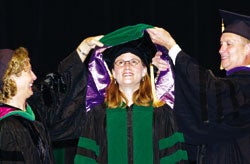Champion of childhood reading urges grads to listen to patient stories
GREENVILLE, N.C. (June 5, 2002) — A medical school class known for its commitment to the community heard an inspiring talk from a physician who has made community service a cornerstone of her practice at this year’s convocation for the Brody School of Medicine at East Carolina University.
Seventy-one medical students, the 22nd class to graduate, took the stage at Wright Auditorium May 10 for the annual ceremony preceding commencement. Amid a mix of quiet pride and emotional cheers from family members, class members heard a physician-writer who urged them to acquire an ear for their patients’ stories.

Heidi Grissom gets “hooded” by Drs. Diana Antonacci and Randy Renegar, assistant deans for student affairs. Photo by Cliff Hollis
“What the doctor sees is what the writer knows: We live in a world full of stories,” said Perri Klass, a pediatrician on the faculty of Boston University School of Medicine and a champion of childhood literacy. Medicine, she said, is “a wonderful profession for busybodies,” allowing unprecedented access to virtual strangers who trust you by virtue of your position.
She told the class they will be privileged to be present at crucial moments of their patients’ lives “when they learn that they are going to live, going to die, going to have a child” with a thousand variations.
“Watch for that moment that means everything to your patient’s life” and try to see it from their side, counseled Klass. Among other benefits, she said, the young physicians will learn that their own personal dramas are “small potatoes.”
Klass, an accomplished author whose short stories have won five prestigious O. Henry Awards, is best known as medical director of Reach Out and Read, a national project that makes literacy promotion part of pediatric primary care.
ECU medical students established a Reach Out and Read chapter at the Brody Pediatric Outpatient Center two years ago after a visit from Klass. Doctors present an age-appropriate book to a child at each appointment from the age of 6 months to 5 years. Volunteers read aloud to children in the waiting rooms and show parents various reading techniques.
Klass has written, “When I think about children growing up in homes without books, I have the same visceral reaction as I have when I think of children in homes without milk or food or heat: It cannot be, it must not be. It stunts them and deprives them before they’ve had a fair chance.”
Class President Brian Short noted the class of 2002 earned its reputation for a commitment to community service. In various projects, members have raised money for the Greenville Community Shelter, the Fountain Indigent Care Clinic, the American Cancer Society and classmates in financial need, including three who were hard hit by the flood of 1999. Several class members have taken part in foreign-service missions.
To Short, these selfless acts demonstrate the students are ready to become physicians, “not just as healers, but as counselors, role models and community leaders.”
Awards were presented to class members and faculty at an earlier event. Jennifer Little of Southern Pines won the Faculty Award, emblematic of the most outstanding student. Erin Parrish of Smithfield received a special appreciation award from the class.
Among faculty members, Dr. Paul Strausbauch of the Department of Pathology and Laboratory Medicine and Dr. Mary Jane Barchman, a nephrologist with the Department of Internal Medicine, received awards as the best basic science and clinical science teachers. Pathology won the basic science course award and the Department of Obstetrics and Gynecology the clinical science course award.
Resident of the year was Dr. David Tarter, who is pursuing a combined medicine/pediatrics residency. Dr. Kalavathi Kolappa of the Tideland Mental Health Center in Washington won the Community Physician Award.
Melissa Anne Beretich of Clinton, in her response on behalf of the class, noted that the air seemed “extra clean and extra sweet” that morning.